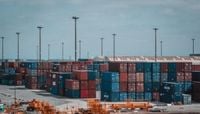As Nigeria intensifies efforts to attract more foreign exchange into the economy, trade experts are calling for a significant increase in the number of exporters relative to importers. This move is seen as crucial to boosting local production and enhancing the nation’s economic resilience. During a recent town hall meeting organized by the Bankers’ Committee in Lagos, Bamidele Ayemibo, the lead consultant at 3T Impex Consulting, emphasized the urgent need to expand the base of exporters in Nigeria.
Currently, the Nigerian Export Promotion Council (NEPC) reports that there are only about 1,200 exporters in Nigeria, a stark contrast to other countries that boast tens of thousands. Ayemibo stated, “My recommendation is that we must urgently work towards increasing the number of exporters in Nigeria.” He highlighted that many importers are partially prepared for export, but they require a clear understanding of the benefits of exporting to diminish their dependence on the Central Bank of Nigeria (CBN) for foreign exchange.
Improving product quality and adhering to international standards is essential, according to Ayemibo. He called for the provision of single-digit interest rates for exporters, which he believes would stimulate local production and support businesses in becoming export-ready. “If more people are adequately prepared for export, they will find ways to raise the necessary funds. And it doesn’t always have to be through banks, considering the high interest rates,” he explained.
Aisha Olatiwon, the director of the Consumer Protection and Financial Inclusion Department, described the town hall meeting as a timely platform to explore collective solutions to ongoing challenges. She stated, “The theme of this town hall meeting highlights the urgent need to elevate our standards to meet international benchmarks, not just to boost exports but to build consumer confidence in locally made goods.”
Chinyere Tony-Eke, Group Head of Digital Banking at Globus Bank, stressed the importance of transitioning Nigeria’s economy towards one that is more export-driven. She noted that achieving international competitiveness requires structured collaboration among government, the private sector, and individuals. “Targeted capacity-building initiatives must be directed at both businesses and individuals, particularly within local communities,” she said.
In his remarks, Ayo Subair, the executive chairman of the Lagos Inland Revenue Service (LIRS), pointed out that the financial sector plays a vital role in providing the necessary capital and innovation to fuel entrepreneurship and drive national economic growth. He asserted, “The theme of this town hall meeting resonates strongly with the joint aspirations of the public and private sectors, which is to unlock the full potential of Nigeria’s financial system in a resilient and inclusive manner.”
Francis Meshioye, president of the Manufacturers Association of Nigeria (MAN), echoed the call for a reduction in the cost of funds available to businesses. He urged the Bankers’ Committee to reassess how they can better support the production sector in response to evolving global dynamics. Meshioye highlighted that manufacturers spent about N1.3 trillion on interest payments and the cost of funds in 2024 alone, along with an additional N1.2 trillion on energy costs. “These two factors account for roughly 30 to 35 percent and 30 to 40 percent, respectively,” he noted.
As Nigeria grapples with these economic challenges, a steep drop in crude oil prices is also impacting its financial landscape. Analysts predict that this decline, partly due to tariffs imposed by US President Donald Trump, will further squeeze the budgets of emerging market oil exporters, including Nigeria. Brent crude prices plummeted by more than 20 percent within a week following the announcement of the tariffs on April 2, 2025, reaching a four-year low. Although prices have since recovered to around $66 per barrel, they remain well below the average budget assumptions of $69 across main oil exporters’ year-ahead projections.
Oil exporting states, including Nigeria, Angola, and Venezuela, are expected to feel the pinch of losing hard-currency revenues. Oil accounts for about 90 percent of Nigeria’s exports, and crude earnings were projected to fund 56 percent of this year’s budget. However, given the current price drop, the Nigerian government is now reassessing its budget plans. Finance Minister Wale Edun stated, “We are going back to the drawing board to look at our budget all over again.”
Angola, in particular, has already begun feeling the effects of the price drop. The country had to pay $200 million after JPMorgan issued a margin call on a loan backed by Angola’s dollar bonds. The finance ministry confirmed that Angola fulfilled its obligation on time and in cash, but the situation highlights the vulnerabilities faced by oil-dependent nations.
Furthermore, the decline in crude prices is also affecting frontier markets’ debt trades. JPMorgan noted that the Nigerian carry trade, which involved investing in the oil exporter’s Treasury bills, is now at risk as the lower crude prices could lead to depreciation of the naira. The central bank has had to increase its dollar sales interventions to avoid convertibility risks and limit a disorderly move.
While oil importers like Turkey, India, and Pakistan may benefit from lower crude prices, the overall outlook remains uncertain. Analysts warn that although the lower oil price outlook is positive for importers, it is unlikely to counterbalance the significant headwinds from the trade war and other economic risks. “The lower oil price outlook is positive for oil importers, albeit unlikely to counterbalance the significant headwinds from the trade war and the significant downside risks,” said Monica Malik, chief economist at Abu Dhabi Commercial Bank.
In conclusion, Nigeria stands at a crossroads as it seeks to bolster its export capacity amid fluctuating oil prices and economic challenges. The collective efforts of stakeholders from various sectors will be crucial in navigating these turbulent waters and ensuring that the Nigerian economy can thrive in the global market.





